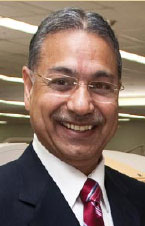 Dr. Harinder Sandhu
Dr. Harinder Sandhu
 Dr. David Mock
Dr. David Mock
Examining how dental educators can support efforts to improve access to oral health care for special needs and geriatric patients was a primary topic of discussion at the Association of Canadian Faculties of Dentistry (ACFD) Biennial Conference, held in June 2009. Presentations at this event, co-hosted by the University of Toronto (UofT) faculty of dentistry and the Schulich School of Medicine & Dentistry of the University of Western Ontario (UWO), made it clear that while there are some existing programs that educate dentists, raise awareness and provide treatment for these high-risk populations, far more work needs to be done.
Four speakers at the ACFD conference— Drs. Ross Anderson, Barry Waldman, Ronald Ettinger and Michael Sigal—are featured in this edition of JCDA. Each author addresses specific challenges facing the profession on the issue of access to care for persons with special needs.
Of particular significance to Canadian dentistry, Dr. Sigal notes that among the approximately 4.4 million persons with disabilities in Canada, dental care remains one of the most required health services yet it is also the hardest to find. He attributes this situation in part to a lack of educational training and to dentists’ preference for referring patients with disabilities to hospital clinics for care—a significant problem since most hospital clinics have extremely long waiting lists, especially for cases that require general anesthesia.
Dr. Sigal knows these challenges firsthand through his work at Mount Sinai Hospital in Toronto, where he helped establish a program that provides dental treatment for persons with disabilities and special needs. This clinic, the largest of its kind in Canada, has seen its patient population double in the last decade, a clear indication that there is a need for more oral care services for this group.
Schulich Dentistry and the UofT dental faculty are committed to increasing the availability and accessibility of oral health care for persons with special needs. Both faculties intend to support initiatives that provide these patients with a dental home.
To find successful models to emulate, we can look to how dentistry has worked with the Ontario government in finding ways to provide care for low-income families. In 2009, the government expanded its dental program for children in need to include youths up to age 18 while also allotting increased funds toward prevention and treatment services for some low-income families, delivered through its public health units.
Provincial funding also helped UofT establish a Pediatric Surgicentre in 2008, to provide oral care to children requiring general anesthesia. The centre’s one active unit was quickly booked to capacity, and despite still having wait times, it has relieved some of the pressure from local hospital operating rooms. Schulich Dentistry is hoping to establish a comparable centre that would serve the UWO community.
We believe Canadian dental schools can rise to the challenge of finding new ways to provide oral health care for vulnerable populations. A great example of dental students mobilizing in this area is the Oral Health Total Health program— a student-run, non-profit organization established by UofT dental students with a mission to increase advocacy and education efforts in treating people with special needs. An Oral Health, Total Health chapter was recently established at Schulich Dentistry and the students’ hope to expand the program to every Canadian dental school.
Although the oral health care requirements of special needs patients are being addressed, more work needs to be done to meet comprehensive standards of care. We hope that all Canadian dental schools can increase their efforts to fill the gaps in service for high-risk populations. The ACFD is embarking on a 5-year strategic plan designed to increase collaboration between the 10 dental schools in Canada, and providing access to oral health care is one of the strategic priorities. We invite CDA, provincial dental associations and individual dentists to become partners in these collaborative efforts.
